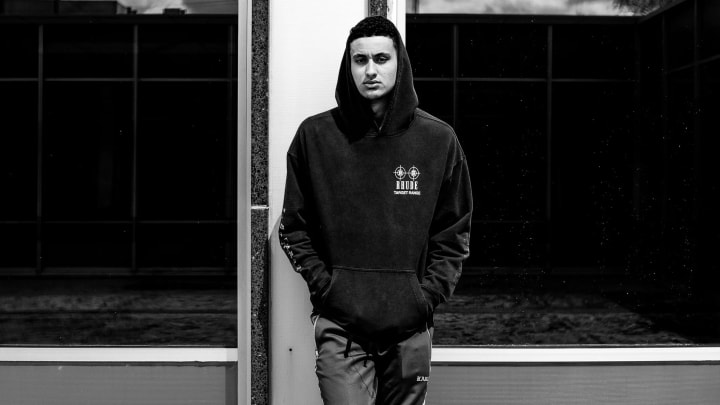
That Could Have Been Me
It started with a simple bike ride. After being let go as the head coach of the Sixers in 2008, I went to Miami to spend time reflecting on what might come next. On this particular day, I left the apartment thinking I was only going out for a short ride to clear my mind. No need to take my I.D. No need to tell anyone where I was going.
I was headed back to my apartment from a convenience store when I felt a cop car tailing closely behind my bike. I didn’t turn around or slow down. I just kept pedaling as steadily as I could.
After a few minutes of cruising behind me, the cop sped up and cut me off in the middle of a quiet, tree-lined street in Coconut Grove. A few people were out walking, but because this was more than a decade ago, nobody thought to film the interaction with their phone.
In fact, it might have even seemed routine: a black guy getting pulled over by the cops.
The officer jumped out of his car and yelled, “Get off your bike. Stand up and put your hands behind your back.”
I stopped and asked, “Why? What did I do?”
He handcuffed me and pushed me to the curb.
“You look like a guy in a white T-shirt who just robbed a house,” he said.
It might have even seemed routine: a black guy getting pulled over by the cops.
He asked me if I had I.D. and I said I did not. He asked me where I was coming from and I said, “My apartment.” By this time, four or five other cop cars had arrived, encircling me. It occurred to me that, if necessary, the clerk at the convenience store where I stopped could help provide an alibi. My heart was pounding, my wrists were aching from the handcuffs, and my natural instinct was to resist.
I wanted to yell that I had done nothing wrong. I wanted to try and get my hands free. I wanted to set the record straight. I wanted to fight the cop who had spoken to me like I was nothing. But I knew that resisting would mean risking my life, so I did everything in my power to remain calm.
I remained calm as the officers marched me across the street so that a man (presumably the man whose house had been robbed) could identify me. I remained calm as two of the officers insisted on following me back to my apartment so that I could show them my driver’s license. I remained calm as they stood outside my front door and waited. I remained calm while they checked my I.D. and left without an apology or an explanation. I even remained calm when I saw the officer parked outside of my apartment the next day.
But I didn’t want to remain calm — I wanted to scream and resist.
I kept those emotions buried for the last 12 years. But when I saw the video of George Floyd being murdered in broad daylight by a cop who was kneeling on his neck, everything came flooding back. How easily that could have been me. What if I had given into my emotions? What if, instead of remaining calm, I had insisted the officer treat me like a human being?
Compared to white adults, black adults are five times more likely to say they’ve been unfairly stopped by police. According to the NAACP, if African-Americans and Hispanics were incarcerated at the same rates as whites, the prison and jail populations would decrease by 40%.
What we ask of black Americans (and what America has always asked) is to be bigger than the system in order to survive. We must always be the bigger person. We must always be superhuman if we are to see tomorrow. But that isn’t how anyone in the United States should be forced to live, and it’s not sustainable if we want to see our children and grandchildren grow up to reach their full potential. To thrive in a country which claims to uphold the ideal that everyone is entitled to the equal pursuit of life, liberty and happiness. Where police departments are designed to protect all citizens.
Growing up in the Robert Taylor Homes on the South Side of Chicago, we saw “the man” (as the cops were called back then) all the time. But we certainly weren’t afraid of them. As long as we were on the South Side, we didn’t fear that an interaction with a cop would suddenly turn fatal without any warning. But the idea that law enforcement was there to protect — that was never really a point of consideration. For many black children who have grown up seeing video after video of boys and girls, and men and women who look like them being killed by police, they do not have the luxury of feeling like the law is there to protect them or that they can call the police for help in times of crisis. This, too, is one of the fatal flaws of the system.
Strange things happen when you go from being a guy who plays basketball to being a guy who plays basketball in the NBA. Chief among them is that you become, to some people, superhuman. As though you’re able to achieve things others can’t. But that day on my bike, I realized the extent to which all black people are in some ways expected to have superhuman control over their emotions — and if they don’t, the results can be deadly.The protests around the country are working, but they won’t build a new system overnight. As we continue to move forward, it’s crucial to create mutual trust and understanding between police departments and the citizens those police departments are designed to protect.
So that black people don’t fear for their lives when stopped by an officer.
So that kids grow up believing that they can become superheroes (not that they have to be one in order to survive).
In America, living your life should not be a matter of life and death.
Can’t we all agree on that?

